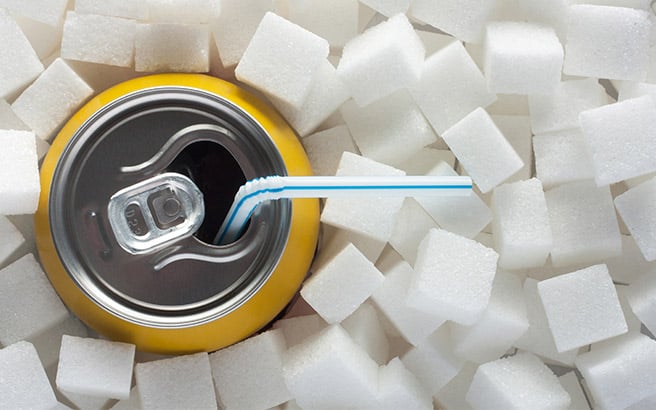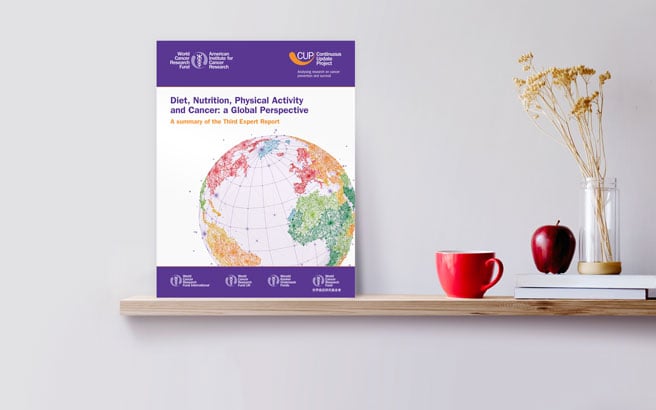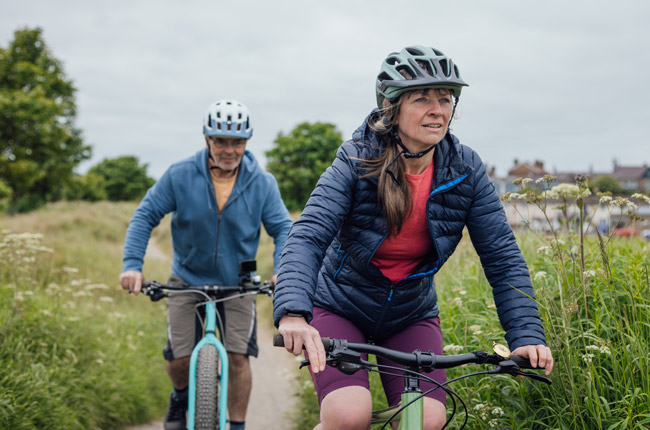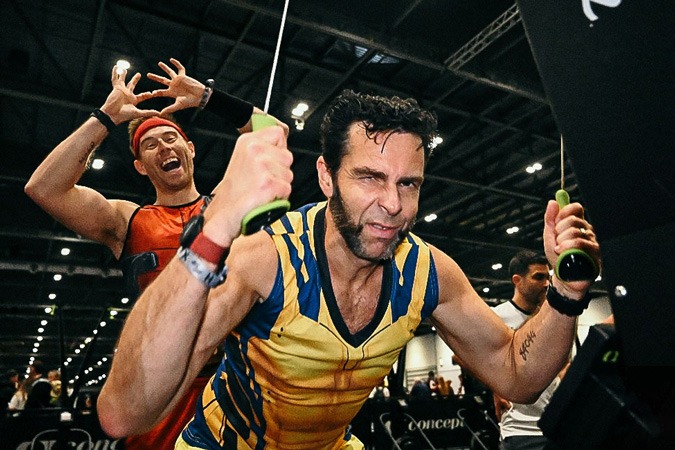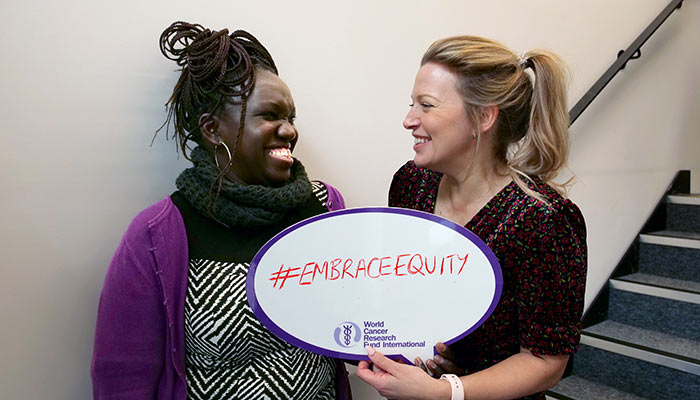Our first Party Conference: prevention, prevention, prevention
Upon entering the conference, I was greeted by a large amount of media and cameras, although, thankfully, none were for me! The conference was much bigger than I had anticipated and unlike anything I had attended in the past – I’ve presented at conferences such as the European Congress on Obesity and the Health Enhancing Physical Activity conference.
There were different halls and arenas where exhibitions, meetings and fringe events were held. The National Farmers’ Union of England and Wales had a large tractor in the exhibition hall, and another organisation had a double decker bus. There was a great atmosphere with each exhibitor eager to share their priorities for the new government.
In the evening, we attended a talk by The Vegan Society, with strong debates on what constitutes a healthy and sustainable diet. We met our first MP, Dr Simon Opher, and gave him our Policy priorities to prevent cancer.
The costs of prevention
Bright and early on Monday morning, I headed back to the conference arena in anticipation of a busy day ahead and had a 45-minute wait in the rain to clear security.
First on our agenda were sessions hosted by IPPR (Institute for Public Policy Research) and the Health Foundation on the government’s plans for health and care with Wes Streeting, Secretary of State for Health and Social Care. Due to the delay in getting into the conference hall, I headed to this event 45 minutes early, which was a blessing. Shortly after I arrived, all seats were taken, meaning many people had to stand at the back, with most spectators standing outside with the hope of listening to the event.

Wes Streeting at the Labour Party Conference 2024
One key message from Streeting’s talk was the economic cost of ill health, particularly unemployment due to ill health, with the government needing to take a whole of society approach to tackle this.
How can we improve health?
The next event was hosted by Nesta, a UK innovation agency for social good, on: Shift to prevention and solutions to improve health. A key message for me was the need for political bravery. Nesta presented a range of policy innovations which, it estimated, could reduce obesity by 23% through creating targets for retailers. But that would require taming industry! Is there enough political will?
Governments know what they should be doing but, often, it’s not the most favourable option due to a whole host of reasons – including financial cost. We need a “health in all policies” approach if we’re going to truly tackle the economic aspects of ill health.
The evening ended on a high when Kate and I attended a reception hosted by the Children’s Charities Coalition with speakers including Andrew Gwynne MP, Parliamentary Under-Secretary of State at the Department of Health and Social Care, and Janet Daby MP, Minister for Children and Families. Once the speeches ended, Kate and I headed in Gwynne’s direction with the hope of giving him our Policy priorities to prevent cancer, as his ministerial portfolio covers many of the policy areas we work under such as obesity, alcohol and physical activity. The stars aligned and we were able to talk to Gwynne and share our briefing. He agreed to meet us after the conference back in London.

Andrew Gwynne MP and Kate Oldridge-Turner
Closing remarks
The final day saw less rain and Keir Starmer, the UK Prime Minister, deliver his speech.
The final fringe event I attended was hosted by the Recipe for Change Campaign and Diabetes UK on how Labour can achieve its ambition to raise the healthiest generation of children. The main takeaway was ensuring prevention is embedded into all aspects of policy outside of health, so, including prevention in housing and children services, for example.
Overall, the conference was very eye-opening and certainly a great way to make connections with key organisations and people. I believe it’s been a worthwhile visit and helped to raise the profile of World Cancer Research Fund and the work we do to prevent cancer. And it was great to hear about the new government’s commitment to prevention. However, we will have to work together to ensure the words turn into action!
- New guidance developed with experts including patients and service users
- Our Cancer Prevention Recommendations are beneficial after a cancer diagnosis
- Comprehensive review of evidence and recommendations for future research directions
Two new in-depth scientific reports, launched at the World Cancer Congress in Geneva, bring together a full synthesis of the current evidence on diet, nutrition, physical activity and body weight from World Cancer Research Fund International’s Global Cancer Update Programme (CUP Global) on people living with and beyond breast and colorectal cancers.
For the first time, they present guidance for people living with and beyond breast and colorectal cancers, caregivers and health professionals. The reports also discuss the limitations of the existing research and make recommendations for future research to strengthen the evidence base.
Relevant and accessible
The CUP Global research team at Imperial College London conducted 7 systematic reviews, together assessing many thousands of recent research papers, studies and databases. World Cancer Research Fund convened expert panels, including oncologists and researchers, as well as patients and people with lived experience of cancer, to ensure the guidance is relevant and accessible.
Prof Andrew Renehan, Deputy Chair of the CUP Global Expert Committee on Cancer Survivorship, said:
These reports are the culmination of over 2 years of detailed work by World Cancer Research Fund International and the CUP Global partnership. They are a substantial and significant body of work and represent the best synthesis of our knowledge to date. As well as providing guidance for oncology health professionals and people living with and beyond cancer, they offer a clear direction for researchers seeking to advance the field.
Lynette Hill, Public Representative on the CUP Global panel, said:
Our challenge was to translate the complex findings from so many scientific papers into simple messages for people living with and beyond cancer. This will help health professionals to answer questions and inform their patients about the role of diet, physical activity and body weight, and the importance of these to their future health.
The reports show how nutrition, physical activity and body weight affect survival and recurrence. For people living with and beyond breast cancer, there is strong evidence that a physically active lifestyle improves health-related quality of life and that a diet high in fibre may improve health outcomes. For colorectal cancer, the evidence suggests that physically active lifestyles and a diet rich in wholegrain foods, and avoiding sugary drinks, may improve health outcomes and overall survival.
Key evidence in the reports was recently published in a series of linked papers in the International Journal of Cancer, published by the Union for International Cancer Control (UICC),
Dr Sonali Johnson, Head of Knowledge, Advocacy and Policy at the UICC said:
The guidance provided in these reports is about giving people living with cancer the tools they need to take control of their health. By focusing on practical changes such improving diet, staying active and managing weight, we can help reduce the risk of cancer coming back and improve the quality of life for so many, bringing us closer to a world where fewer lives are lost to cancer, and more people can live healthier, longer lives after diagnosis.
World Cancer Research Fund’s CUP Global is the world’s largest source of scientific research on cancer prevention and survivorship through diet, nutrition, physical activity and body weight. It is funded in partnership with American Institute for Cancer Research, World Cancer Research Fund in the UK and Wereld Kanker Onderzoek Fonds in the Netherlands.
Dr Helen Croker, World Cancer Research Fund International’s Assistant Director of Research and Policy, and Head of the CUP Global Secretariat, said:
As an evidence-based organisation, we have used the best available evidence to develop this process and produce practical guidance on diet, physical activity and body weight for people living with and beyond cancer. We hope this guidance will help support people to live longer, healthier lives.
By highlighting gaps in the evidence base, the reports show where further, high-quality research is needed. These include well-designed clinical trials and prospective cohort studies, as well as understanding the biological mechanisms involved. We hope this will be a springboard for further progress.
Download the reports
> Breast cancer
> Colorectal cancer
Download the executive summaries
> Breast cancer
> Colorectal cancer
Summary guidance in the reports
- Suggests that people living with and beyond breast and colorectal cancers consider increasing their physical activity, under the supervision of health care professionals.
- Suggests that people living with and beyond breast and colorectal cancers consider following as many of WCRF/AICR’s Cancer Prevention Recommendations as they are able.
- People diagnosed with breast cancer should consider:
- increasing their dietary fibre intake.
- avoiding gaining weight during and after treatment (if not underweight).
- People diagnosed with colorectal cancer should consider increasing their dietary intake of wholegrain foods, and reducing their sugary drink intake.
Much of the research in these reports build on the 2014 (updated 2018) report: Diet, nutrition, physical activity and breast cancer survivors, which was published as part of the WCRF/AICR Third Expert Report on the links between lifestyle/modifiable behaviours and cancer. At that time, research on cancer survival was limited, but there was enough evidence to conclude that people living with and beyond cancer should follow our Cancer Prevention Recommendations if they can.
18 September 2024 update
Our findings have been launched at the World Cancer Congress as guidance for people living with and beyond colorectal cancer.
Read the report:
Read the executive summary:
2 May 2024
Our latest findings have been published in the International Journal of Cancer (IJC), presenting research from our Global Cancer Update Programme (CUP Global) – a comprehensive review of the available literature and evidence.
The CUP Global research team at Imperial College London, supported by World Cancer Research Fund International, conducted comprehensive systematic literature reviews and meta-analyses to evaluate the evidence on body fatness, physical activity, sedentary behaviour and diet with predicted outcomes after a colorectal cancer diagnosis.
Overall, the evidence suggested a physically active lifestyle, a diet rich in plant-based foods, wholegrain foods, and coffee, but avoiding sugary drinks, potentially improve outcomes and overall survival.
The quality of the evidence was independently interpreted and graded by the CUP Global Expert Committee on Cancer Survivorship and Expert Panel. The Panel graded the quality of the strongest evidence as “limited-suggestive”, however, the rest was graded “limited-no conclusion”.
Only very few relevant randomised control trials (RCTs) with relevant exposures were identified. Many of the studies available for review were observational, looking at a relatively small sample over a limited time. The authors and Panel flagged the high risk of possible biases including confounding elements, inaccurate exposure measurements, and selection bias (inclusion only of patients with some accumulated survival time).
The authors and Panel are calling for better-designed intervention trials and large, well-designed observational studies with more accurate and repeated exposure and confounder information to strengthen this evidence-base. This will allow them to develop improved recommendations for colorectal cancer survivors.
Dr Helen Croker, Assistant Director of Research and Policy at World Cancer Research Fund International, said:
This comprehensive and rigorous review of the current state of evidence offers useful guidance on some of the diet and lifestyle factors that could improve cancer survival, and potentially help people living with and beyond cancer enjoy longer, healthier lives.
At the same time, it shows a clear need for more well-designed intervention and cohort studies to support the development of robust recommendations for colorectal cancer patients and health professionals. As we are seeing an increase of people diagnosed with colorectal cancer at younger ages, it is more important than ever that health advice is based on high-quality research.
Dr Doris Chan, Senior Research Fellow in Nutrition at Imperial College London, and Dr Kostas Tsilidis, Reader in Cancer Epidemiology and Prevention at Imperial College London – both CUP Global lead researchers – said:
We are delighted that our findings have been evaluated by the Expert Panel and are published today in IJC. We analysed several hundred studies, and although most had limitations and potential biases, we are confident that it represents the best and most up-to-date body of evidence that can assist people living with or beyond cancer in making evidence-based decisions on lifestyle changes that can improve their well-being. We are now moving forward with the next phase of CUP Global, including employing AI-enhanced tools to assist us in our examination of cancer risk factors and prevention strategies.
Prof Rudolf Kaaks, Chair in Cancer Epidemiology at the German Cancer Research Center, is the author of the IJC editorial that accompanies the papers. He wrote:
Through its international Global Cancer Update Programme WCRF takes up a central role in organising international expert reviews to summarise the impact of diet, physical activity and excess body weight which provides reliable recommendations on body weight, physical activity and diet in relation to cancer risk.
WCRF and the Imperial College London research team in charge of the CUP Global evaluations are to be commended for their continuing efforts of summarising findings from nutritional epidemiology studies setting highest possible standards for scientific evaluation.
Prof Kaaks’ editorial also refers to a set of linked papers on breast cancer survival, published by the CUP Global team in 2023.
International Journal of Cancer is a bi-weekly peer-reviewed medical journal, and the official journal of the Union for International Cancer Control (UICC).
Dr Sonali Johnson, Head of Knowledge, Advocacy and Policy at the Union for International Cancer Control, said:
The Union for International Cancer Control commends the World Cancer Research Fund for its rigorous scientific inquiry, further advancing our understanding of cancer survivorship, as well as improving outcomes and the quality of life of people who have had cancer. This study also underscores the importance of robust research and data in informing protocols, policies and national cancer strategies.
Colorectal cancer papers
Post-diagnosis physical activity and sedentary behaviour and colorectal cancer prognosis: a Global Cancer Update Programme (CUP Global) systematic literature review and meta-analysis.
> Read this paper, published in the IJC
Post-diagnosis adiposity, physical activity, sedentary behaviour, dietary factors, supplement use and colorectal cancer prognosis: Global Cancer Update Programme (CUP Global) summary of evidence grading.
> Read the summary of evidence grading in the IJC
Post-diagnosis adiposity and colorectal cancer prognosis: a Global Cancer Update Programme (CUP Global) systematic literature review and meta-analysis.
> Read this paper, published in the IJC
Post-diagnosis dietary factors, supplement use and colorectal cancer prognosis: a Global Cancer Update Programme (CUP Global) systematic literature review and meta-analysis.
> Read this paper, published in the IJC
Editorial:
Breast cancer papers
All 4 previously published papers can be found here:
Post-diagnosis body fatness, recreational physical activity, dietary factors and breast cancer prognosis: Global Cancer Update Programme summary of evidence grading.
> Read the paper published in the IJC
Post-diagnosis recreational physical activity and breast cancer prognosis: Global Cancer Update Programme systematic literature review and meta-analysis.
> Read this paper published in the IJC
Post-diagnosis body fatness, weight change and breast cancer prognosis: Global Cancer Update Programme systematic literature review and meta-analysis.
> Read the paper published in the IJC
Post-diagnosis dietary factors, supplement use and breast cancer prognosis: Global Cancer Update Programme systematic literature review and meta-analysis.
World Cancer Research Fund International has convened a new Science Executive Committee to steer its scientific programmes, including the flagship Global Cancer Update Programme.
Prof Elio Riboli, chair in Cancer Epidemiology and Prevention at the School of Public Health, Imperial College London, will chair the Committee in his new role as World Cancer Research Fund’s International Medical and Scientific Adviser. Dr Panagiota Mitrou, Director of Research, Policy and Innovation at World Cancer Research Fund International, will co-chair the Committee.
The Science Executive Committee will advise on progress, new research directions, dissemination of outputs, policy implications, and opportunities for leverage with stakeholders and partnerships.
‘We must face the reality’
At the inaugural meeting, which took place in London last month, Prof Riboli said:
“I am delighted to be supporting this vital work at a very exciting time. Our understanding of the links between nutrition, weight, physical activity and cancer continues to increase, and there are great opportunities to influence both the direction of research and public health policy.
“At the same time, we must face the reality that in many countries, the trend is for increasing consumption of processed and red meat, sugary foods and drinks, and other unhealthy food. These dietary habits, combined with low levels of physical activity, contribute to the increase in overweight and obesity, and in the incidence of many common chronic diseases around the world. We need to understand and focus on system-level interventions that improve the health of individuals and populations – and this is a huge challenge.”
Dr Mitrou said:
“Prof Riboli is one of the world’s eminent leaders in cancer epidemiology and prevention. We’re delighted that he’s joining World Cancer Research Fund as our Medical and Scientific Adviser. His input will be vital to build on the success of our funded research through our grant programmes and our global expert reports on diet, nutrition and physical activity in relation to cancer prevention and survival. Our ultimate aim is to strengthen our science strategy, explore new directions and translate evidence into policy.”
World Cancer Research Fund International is a leading authority on the links between diet, nutrition, weight, physical activity and cancer. It is in official relations with the World Health Organization (WHO) and works with partners globally to promote policies that prevent cancer and other non-communicable diseases.
Rachael Gormley, CEO of World Cancer Research Fund International, said:
Our vision is a world where no one develops a preventable cancer, and people living with and beyond cancer are enabled to make informed choices and enjoy longer, healthier lives. We can only realise this in partnership with others, taking leadership in some areas and supporting in others. With his experience and eminence in the field, Prof Riboli is a tremendous addition to our team.
The other members of the Committee are:
- Nadia Ameyah (Wereld Kanker Onderzoek Fonds)
- Jennifer Mercer (American Institute for Cancer Research)
- Dr Nigel Brockton (American Institute for Cancer Research)
- Dr Helen Croker (World Cancer Research Fund International)
- Vickie Gregory (World Cancer Research Fund International)
About Prof Riboli
Prof Riboli has made an exceptional impact on the fields of epidemiology, cancer prevention and the fight against chronic illness. Before coming to Imperial, he worked at the International Agency for Research on Cancer, the specialised cancer agency of the WHO, where he initiated groundbreaking research on the role of diet, nutrition and metabolic health in cancer causation and prevention.
He designed and led the establishment of the largest international population cohort studies on nutrition and cancer – the European Prospective Investigation into Cancer and Nutrition (EPIC) – which recruited more than half a million participants, with rich phenotyping data and blood samples stored in the first dedicated large-scale population biobank.
At Imperial, he has continued to lead research on modifiable cancer risk factors, including metabolic syndrome components and inflammation.
In recognition of his achievements, Prof Riboli was elected an Honorary Fellow of the Faculty of Public Health of the Royal College of Physicians and a Fellow of the Academy of Medical Sciences.

